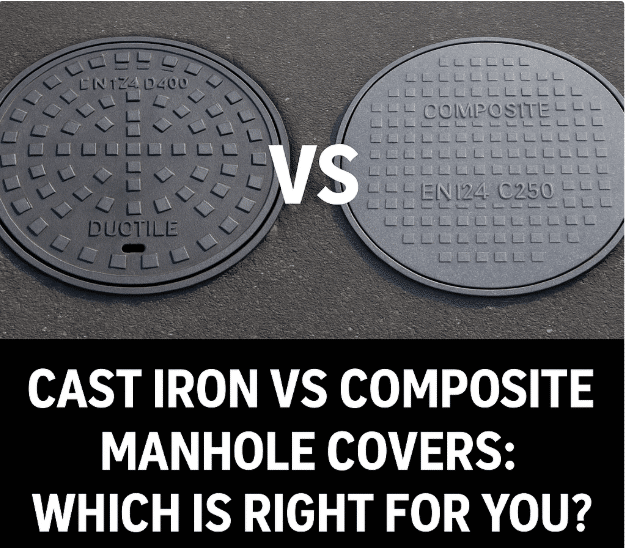Manhole covers are vital components of modern urban infrastructure. They provide secure access to underground utility networks while ensuring public safety. When choosing between cast iron and composite manhole covers, engineers and project managers must weigh multiple factors such as strength, durability, weight, and cost-efficiency. This article presents a professional analysis to help you determine which type of manhole cover best suits your application.
Understanding Cast Iron Manhole Covers
Cast iron manhole covers have long been the industry standard. They are known for their exceptional strength and load-bearing capacity. Manufactured from grey or ductile iron, these covers are suitable for high-traffic areas such as highways, ports, and city intersections.
Key Advantages of Cast Iron:
- High Load Capacity: Cast iron offers robust performance under heavy loads, making it ideal for areas with frequent truck or bus traffic.
- Long Service Life: With proper maintenance, cast iron covers can last for decades without significant wear.
- Thermal Stability: They withstand extreme temperature fluctuations without cracking or deforming.
- Recyclability: Cast iron is environmentally friendly due to its full recyclability.
However, cast iron covers are heavy, which makes installation and removal more labor-intensive. Additionally, their scrap value may attract theft if not properly secured.
Introduction to Composite Manhole Covers
Composite manhole covers are made from materials such as fiberglass, resin, and reinforced plastics. Over the last two decades, they have gained popularity for various civil engineering projects, especially in residential areas, green zones, and telecom installations.
Notable Benefits of Composite Covers:
- Lightweight Design: These covers are significantly lighter than cast iron, allowing for easier handling and faster installation.
- Corrosion Resistance: Composite materials do not rust, which makes them ideal for coastal or chemically aggressive environments.
- Non-Conductive Properties: They are safer for electrical or telecom applications due to their insulating characteristics.
- Anti-Theft Design: With low resale value and locking mechanisms, composites offer strong anti-theft performance.
Nevertheless, composites may not always match cast iron in terms of compressive strength. As such, they are generally used in light to medium load zones unless specifically engineered for heavy-duty performance.
Performance Comparison Table
| Feature | Cast Iron Covers | Composite Covers |
|---|---|---|
| Load Capacity | High (up to Class F900) | Medium to High (up to C250 or E600) |
| Weight | Very Heavy | Lightweight |
| Corrosion Resistance | Moderate | Excellent |
| Theft Resistance | Low | High |
| Life Cycle Cost | Moderate to High | Low to Moderate |
| Application Suitability | Roads, Airports, Industrial | Parks, Sidewalks, Substations |
How to Choose the Right Manhole Cover?
Selecting the appropriate manhole cover depends on your project’s load requirements, environmental conditions, and budget constraints. Use the following criteria:
- Traffic Volume and Load Rating: For areas with frequent heavy vehicles, always choose covers rated D400 or higher. Cast iron is typically preferred here.
- Location Conditions: In corrosive environments or coastal cities, composite covers offer superior resistance to rust and decay.
- Installation Efficiency: If the project requires quick deployment and frequent access, composites reduce installation time and workforce demand.
- Safety and Theft Prevention: Composite materials deter theft and reduce injury risk during lifting due to their lower weight.
- Aesthetic Requirements: For urban green belts or landscaped areas, composite covers offer better integration through color-matching and design flexibility.
Cost Efficiency and Maintenance
Although cast iron covers tend to have a longer lifespan, composite covers generally offer lower lifetime costs due to their reduced maintenance needs. They do not require repainting or anti-rust treatments. Moreover, their lightweight nature results in reduced labor and machinery expenses during maintenance.
From a total cost of ownership (TCO) perspective, composite covers may provide better value for low to medium traffic projects. In contrast, cast iron remains indispensable where safety and structural performance are paramount.
Environmental Considerations
Composite covers are typically produced using low-emission processes. They also help reduce transportation emissions due to their lighter weight. Cast iron, while fully recyclable, involves energy-intensive manufacturing.
For green-certified projects, composite manhole covers may contribute to sustainability goals and LEED credits.
Conclusion
Choosing between cast iron and composite manhole covers depends largely on project-specific requirements. If your priority is maximum strength and long-term durability under extreme load, cast iron is your best option. However, if you’re managing a project in a residential, coastal, or landscaped area where corrosion resistance, lightweight handling, and anti-theft properties are essential, composite covers are an ideal alternative.
Always evaluate the load class, environmental exposure, maintenance capacity, and project lifecycle cost before making a final decision.
FAQs
Q1: Can composite manhole covers be used in heavy traffic areas?
A: Yes, but only if they are certified to high load classes such as D400 or E600. For extreme load zones, cast iron is still recommended.
Q2: Are cast iron covers more expensive than composites?
A: While the initial price may be similar or higher, cast iron may involve higher maintenance and handling costs over time.
Q3: Do composite covers degrade in UV or heat?
A: High-quality composites are UV-stabilized and heat-resistant, making them suitable for most outdoor conditions.
Q4: Which is more secure against theft?
A: Composite covers have minimal scrap value and often come with built-in locking systems, making them highly theft-resistant.
Q5: What brands offer reliable manhole covers for different applications?
A: Xinghua Casting is known for producing durable and cost-effective manhole covers in both cast iron and composite materials, trusted by municipalities and infrastructure developers worldwide.





